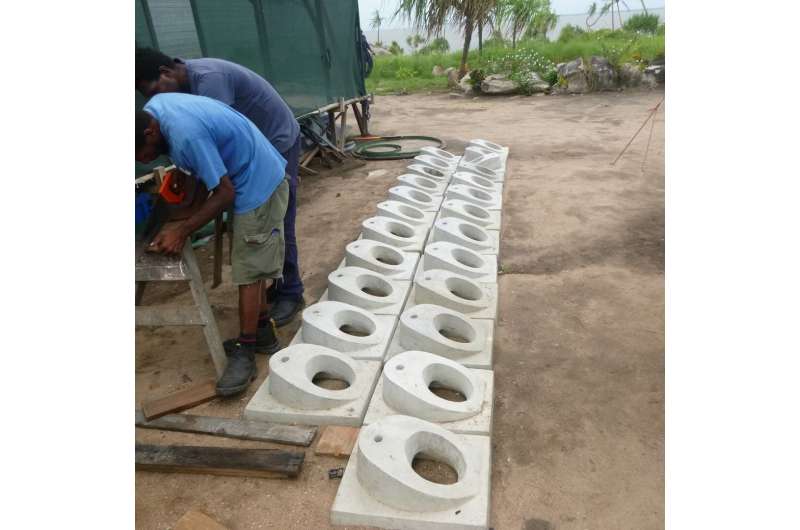Hand-building dry toilets in Papua New Guinea's coastal villages to fight climate change impacts

An innovative Australian government funded development program, operating in the borderlands between Australia and Papua New Guinea, has established a local toilet manufacturing business that is both improving sanitation and increasing the self-sufficiency of local communities in the face of climate change impacts.
The Building Resilience in Treaty Villages (BRTV) program, an innovative development program operated by the Reef and Rainforest Research Centre (RRRC), is changing lives in the Treaty Villages through the skilling of Community Rangers who provide vital services to the communities.
The Treaty Villages are a string of 13 communities along the coast of South Fly District of Western Province, less than four kilometers from Australia's Torres Strait islands of Saibai and Boigu.
Community Ranger candidates are selected from among the villages by local elders and are trained by Australian training company INLOC in partnership with RRRC in a wide variety of community-building skills including first aid, construction, sanitation, timber, boat handling, disaster response, leadership, business skills and information technology.
Since the program was established in 2015, Community Rangers have constructed or repaired dozens of new buildings and water wells, established thousands of liters worth of clean water storage and have responded to hundreds of first aid incidents, including many life-threatening situations.
To meet the program's key objective of building resilience in the Treaty Villages, rangers have established a microbusiness that answers a demand for sanitary, self-contained toilets in the villages, where there is a major risk of sewage contaminating groundwater used for drinking due to kingtide inundation linked to climate change.
Rangers are producing and installing two types of Urinary Diversion Dry Toilets (UDDTs) – which separate liquid and solid human waste into different storage containers—the Ranger Community Toilet for use at public facilities like schools and aid posts, and the Ranger Family Toilet for use by family groups.
The toilets are 100 percent locally produced by the rangers, including the cast-concrete bowls which are cured with coconut oil and all building materials.
INLOC CEO Dave Rutherford said the Ranger Toilets were another example of how the program was innovating to produce results on the ground in the climate change-affected Treaty Villages.
"You can't put in regular pit toilets because the combination of the floods and these king tides—which are a climate change impact—means that the sewage gets into the water table which contaminates the all groundwater drinking sources and also overflows the pit toilets and spreads sewage through the whole village," he said.
"This is why the UDDT-style Ranger Toilets are the way to go, they isolate the sewage from the water table so there's no risk of contamination during flood events. Because the rangers can build them completely from scratch it means they don't have to wait or pay for anything to be shipped in, so they're ideal.
"Good sanitation underpins the entire health system of a community, especially one with limited access to modern medical services like the Treaty Villages, so what the toilets represent is an innovation against climate change impacts and also a grassroots community-led microbusiness."
RRRC managing Sheriden Morris said the program was enabling the Treaty Villages to adapt to the impact of climate change.
"These are communities right next door to Australia where you really see climate change impacts and adaptation to those impacts happening in real-time, whether it's new toilets to deal with contamination from the king tides or new crops to deal with the droughts," she said.
"Climate change isn't theoretical at all for the Treaty Villages—it's a real life-or-death situation for them."
Sheriden also highlighted the importance of the BRTV program's "aid development" approach in a northern Australian context.
"The Community Ranger model is one we have adapted from ranger programs in Indigenous communities in Northern Australia, so we are really leveraging Australia's tropical expertise for this program. The approach is based on providing community-building skills and training to boost resilience of challenged communities and provide opportunities for self-reliance.
"It's very important to remember that the Treaty Villages represent Australia's closest neighbor, they are our borderlands. What impacts them impacts Australia, especially northern Australia.
"In supporting their village leadership through their work, the Community Rangers are enabling the Treaty Villages to take control of their own future."
Mabaduan elder Peter Papua said the program was a "great opportunity" for the Treaty Villages.
"I am very supportive of the ranger program because it is helping develop economic opportunities here in the villages as well as a lot of other benefits," he said.
"The rangers are doing good work for their communities, helping them grow and improve their health and economy."
Adapted from a successful Indigenous scheme operating in northern Australia, the Building Resilience in Treaty Villages (BRTV) program is supported by the Australian Government and aims to increase the self-reliance of 13 coastal villages in Papua New Guinea's South Fly District of Western Province covered under the Torres Strait Treaty.
Managed by the Cairns-based Reef and Rainforest Research Centre (RRRC) and implemented by INLOC, the BRTV program involves the recruitment and training of people living in remote villages to enable locals to drive change in their communities.
More information: For more information about the Building Resilience in the Treaty Villages Program, visit the RRRC website at www.rrrc.org.au/png-treaty-villages/
Provided by Reef and Rainforest Research Centre

















